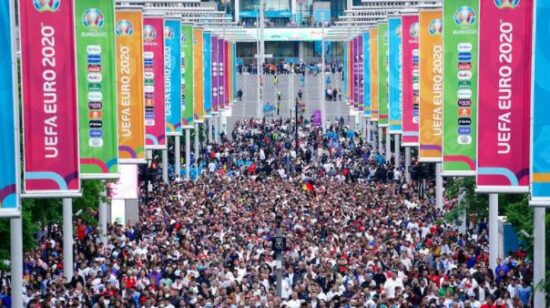August 7 (SkyNews) – Three days after the England v Scotland match at Wembley Stadium, the coronavirus pandemic peaked in Scotland, with more than half of recorded cases having either attended a Euro 2020 event or having been in close contact with someone who had, according to Public Health Scotland.
In an analysis published in the journal Eurosurveillance, PHS researchers said Scotland’s early exit from the tournament may have contributed to the subsequent fall in COVID-19 cases.
Subscribe to the most important and interesting stories from newsin.asia
“The majority of the cases reported attending unofficial Euro 2020 events linked to smaller gatherings such as house parties, visits to pubs and restaurants, as well as extended travel highlighting a need for targeted guidance on how to safely celebrate in small informal gatherings with appropriate social distancing, proper ventilation and mask-wearing in closed spaces,” the paper said.
The games took place as the Delta variant became the dominant strain of coronavirus in Scotland and as the country began easing lockdown measures.
Of the 63,874 new COVID-19 cases recorded in Scotland between 11 June and 7 July, 2,632 (4%) were related to Euro 2020.
Read more – Those with double vaccine doses 3 times less likely to get Covid, finds UK study
Contact tracing data showed positive Euro 2020 cases had an average of 5.6 close contacts during that time, compared to 3.2 in the general population.
Cases were tagged if they attended either a Euro 2020 organised event, such as matches at Wembley or Hampden or the fanzone at Glasgow Green, or an informal gathering such as a pub or house party to watch the match.
Overall, 90% of the recorded positive cases were men and 73% were aged between 20-39.
A total of 452 cases had visited Wembley Stadium (15%), while 216 (7%) watched the four Euro 2020 matches held at Hampden Park in Glasgow, including the two in which Scotland played.
Some 61% travelled down to London while 34% said they watched the match live at a hospitality venue such as a pub.
Most of those who travelled to London used trains, followed by private cars, flights and buses.
“Evidence of the potential risks in transmitting SARS-CoV-2 in vehicles is especially well documented, yet travel to London by private cars and public buses were common,” the paper said.
By 22 June, an estimated 51% of all positive coronavirus cases in Scotland had attended a Euro 2020 event or were close contacts of someone who had.
“This is not surprising, given that the country’s return to the Union of European Football Associations Euro competition after 23 years offers an opportunity for celebration,” the paper said.
Six days later, Scotland reported 3,930 cases – its highest ever number.
The steep rise in cases among men aged 20-39 “probably occurred as a result of more frequent social gatherings surrounding the Euro 2020 matches, rather than from official Euro 2020 events,” the paper said.
It suggested that the number of cases among younger males could be because of low vaccination coverage in that age group, with only around 19% of men aged 18-29 and 30% of men aged 30-39 fully vaccinated at the time.
However, the researchers caution that while their paper – which is yet to be peer-reviewed – “suggests that the behaviour and events surrounding Euro 2020 games (as opposed to match attendance itself) uniquely contributed to Scotland’s third COVID-19 wave, causality cannot be proven”.
The researchers also warn that because their analysis relied on self-reported data and some people may be reluctant to admit risky behaviours, the actual number of Euro 2020 cases is likely to be higher.
“Our results suggest a clear link between the increase in SARS-CoV-2-positive cases among men aged 20−39 years and the Euro 2020,” the researchers said.
“The behaviour surrounding attendance at Euro 2020-related events rather than match attendance itself may have uniquely contributed to Scotland’s third wave.
“Increased social mixing and travel to London surrounding the games is likely to have increased cases among young men, who currently have lower vaccination coverage than the older population.
“Public health messaging that acknowledges the unique types of risks surrounding these events and educates people about how to best manage them is critical when planning for future large sporting events.
“Early exit of the Scottish football team from the Euro 2020 may have contributed to the subsequent reduction in cases that are now being observed.”
For similar articles, join our Whatsapp group for the latest updates. – click here





























































